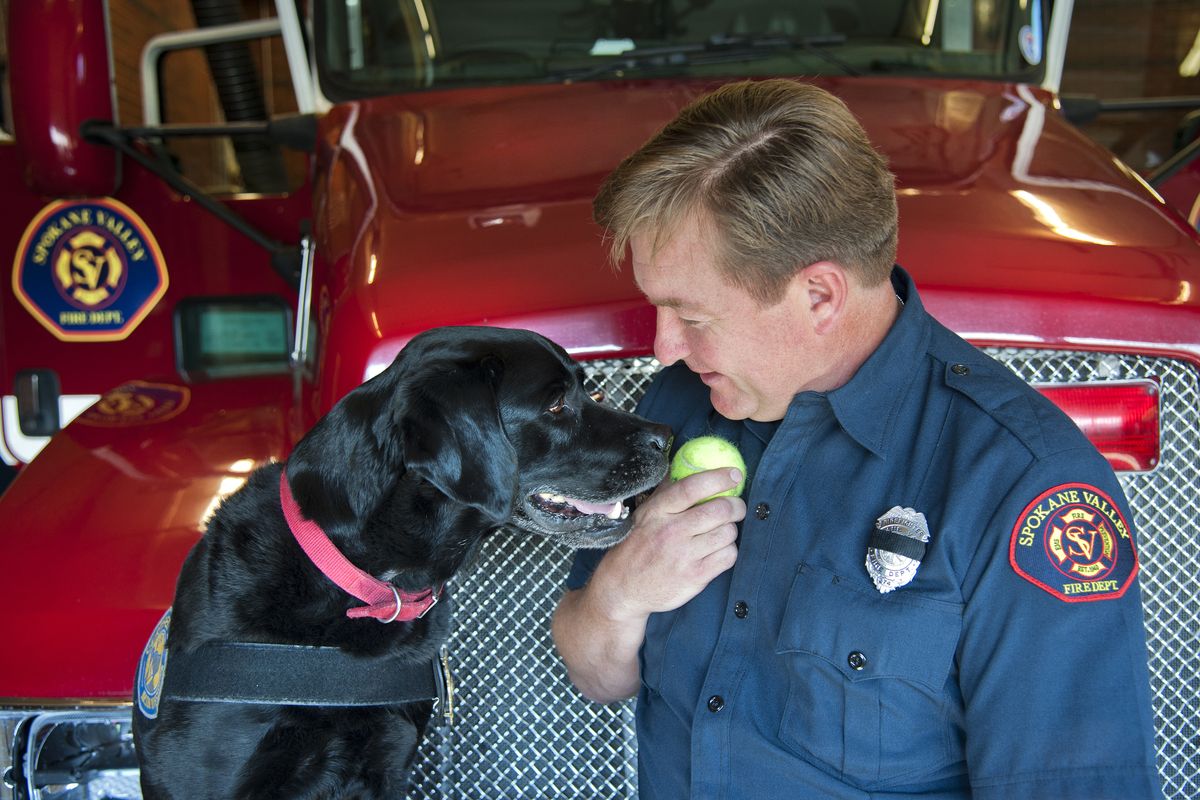Arson-detecting dog being ‘retrained’ for retirement

The adjustment to retirement can be difficult: being at home all day instead of at work, missing the interaction with co-workers, the need to sniff gasoline before sitting down to a bowl of food.
Mako, an arson dog who worked for the Spokane Valley Fire Department for five years, retired last month. His handler and owner, former fire investigator Rick Freier, said the dog misses hanging out with firefighters.
But about that gasoline sniffing. As a working dog, the only time Mako got fed was after he worked or did training, which he did multiple times every day. That always involved sniffing out accelerants like gasoline. He was trained to ignore dog food lying on the ground, because it was often at fire scenes and he couldn’t be distracted while working.
So now when Freier offers Mako a bowl of food, he refuses to eat until they do a basic gasoline detection drill.
“Now we’re trying to retrain him,” Freier said.
Mako, a 6-year-old black Labrador, was the only accelerant-detecting dog in Eastern Washington and North Idaho and was much in demand throughout the region. He was called in by more than 25 different agencies in those five years, some of them multiple times.
Spokane Fire Department Assistant Chief Brian Schaeffer said his department would call in Mako about twice a month.
“Hands down, a K-9 is better any day than any type of commercial instrumentation,” he said. “It’s a resource that is important to the region. We became really reliant on Mako.”
Schaeffer said there’s an arson dog in Portland, but it’s not feasible to request it for a normal suspicious fire.
“They’re definitely not local,” he said.
During his career Mako helped investigate 187 fires. He would indicate where he detected an accelerant, and Freier would collect a sample to be tested at the lab. The samples tested positive 90 percent of the time and the results were inconclusive in 5 percent of the cases.
“The other 5 percent was just me picking up the wrong thing, probably,” Freier said.
Mako’s nose could detect as little as half a microliter of gasoline, the equivalent of 1/20 of a drop, which made investigations quicker and easier. He and Freier helped investigate the RHI Golf warehouse fire in Hayden earlier this year, where Mako detected gasoline and another accelerant where there shouldn’t be any.
The 8,000-square-foot warehouse was a jumble of debris after the roof collapsed, Freier said, and it’s likely the accelerants would not have been found without Mako.
“He’s the one tool that made it fast,” he said. “Without him, the process is going to be slower. Are we going to miss things that we wouldn’t with him? Yes.”
Despite Mako’s accomplishments, Spokane Valley Fire Chief Bryan Collins said there are no immediate plans to replace him. Collins said the department recently hired a new fire marshal, and Collins wants him to make the decision.
“It’s something we’re taking our time with and evaluating,” he said.
Having an arson dog is a huge time commitment for the handler, and two handlers are really needed, Collins said.
“It’s almost like having a child,” Collins said. “It requires seven-day-a-week, 24-hour-a-day commitment.”
Collins said Mako was quick and accurate in his investigations, but that wasn’t the only area where he shone.
“He was a really effective public education piece in the schools,” he said. “There’s a lot of value in that, too.”
It’s not unusual for working dogs to retire young.
“After five years, it’s a lot of work,” Freier said.
But another driving factor behind Mako’s retirement was Freier’s desire to go back to working on a firetruck, which would allow him more time at home with his family. In 2012 he logged more than 200 hours of overtime and often brought work home. He and Mako were always on call, and public appearances frequently filled their weekends. The two also made presentations on the scientific method to more than 2,400 middle school students.
The need to spend more time at home was driven home when Freier’s 15-year-old daughter Josie was killed in a car crash in October 2013.
“Some dates define history,” he said. “Some dates define your future.”
Mako was paid for by State Farm Insurance, which mandates that dogs must work for five years. So Freier committed to keep working with the dog until the five years were up and credits Mako with helping him get back to normal after his daughter’s death.
“When I first got back to work and for a while after, that’s the only thing that made me smile, was watching him work,” he said. “Mako’s enthusiasm for the job was amazing.”
When Mako wasn’t training or at a fire, he had the run of the department’s administration building. He may have been trained to ignore dog food on the job, but that didn’t keep him from getting into trash cans to look for people food or stealing cookies off desks.
“He’d search every trash can on the first floor,” Freier said. “Then he’d meander upstairs.”
Freier did some refresher training and is now working as a firefighter at the South Valley Station on 32nd Avenue. “You can’t take a firetruck home with you,” he said. “I just want to focus on doing a good job and going home.”
But Freier said both he and Mako will miss investigating fires. He counts as one of their biggest accomplishments the investigation into the fire in Chattaroy earlier this year that was allegedly set to cover up three homicides. One of the victims, Terry Canfield, was a lieutenant with the Spokane Fire Department.
“That was the case me and Mako trained hard for five years for,” he said. “You want to do a good job for the community, not just for the fire department or the family. It was an honor to try to help.”